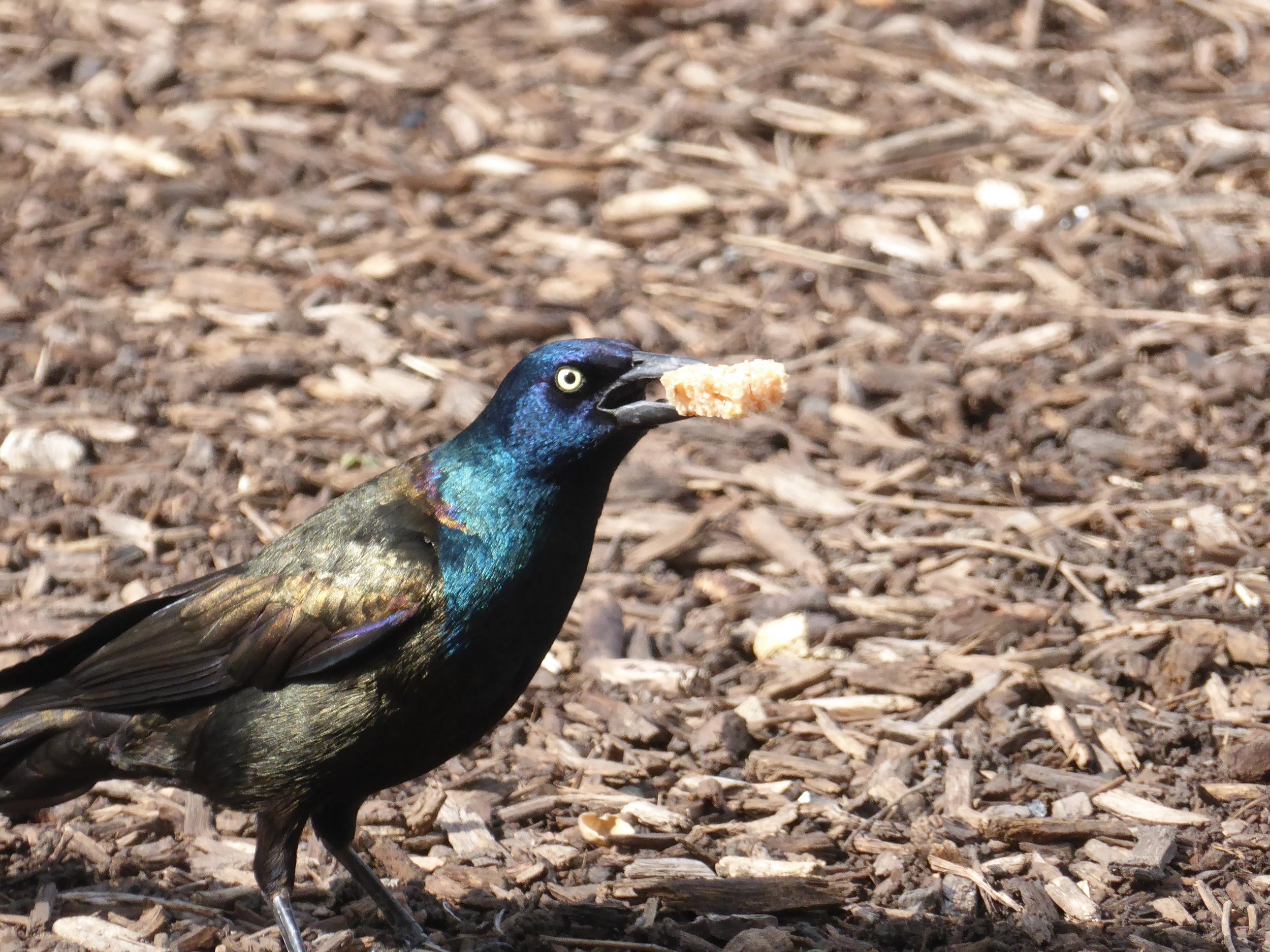Big Eyes, Little Stomachs
Common Grackle. Humboldt Park, April 18, 2021. Photo by Robyn Detterline.
words by Nora Haskell
Cookies. Potato chips. Donuts. Our own sport pepper and neon relish-laden Chicago hot dogs. There’s no shortage of artery-clogging options humans can reach for to celebrate today’s prestigious holiday. Recently social media celebrated National Junk Food Day, and because most of us don’t need a holiday to justify making indulgent decisions at the grocery store, let’s reflect on how the munchies humans share with wild birds impact them.
Birds are perennial junk food enjoyers themselves, and who can blame them? Humans create and discard a lot of it, and free Cheetos make it hard to contain one’s excitement. Yet while junk food may not be the healthiest option for humans either, our species is gifted with an incredible range of items we can safely eat. Birds have neither the anatomy nor the restraint to handle the temptation of a super-size bag of french fries dumped all over the sidewalk, so they need a little assistance from us to make healthy dietary choices. If you choose to give birds a little treat now and then, or even just on National Junk Food Day, stay away from these junk food staples for the good of birdkind.
Bread
Bread is an incredible food that’s been enjoyed by humans and birds alike for millennia, and is almost certainly the most common item intentionally fed to wild birds. Yet as anyone who’s ever indulged in too much complimentary restaurant bread can tell you, it’s also very filling. A few slices of bread are more than enough to fill the stomach of a hopeful duck, but sadly, the high sugar and carb content does not make for a well-rounded duck meal. When handouts from humans cause birds to overindulge, it interferes with the ideal nutritional profile they’d be getting from their usual forage. For young waterfowl, this can even cause a condition called “angel wing,” where their flight feathers grow faster than their bone structure can keep up with. With their flight feathers turned out instead of lying flat against their bodies, they’re unable to fly and therefore miss out on migrations and the useful ability to avoid becoming a tasty snack themselves.
Great-tailed Grackle. Monee, January 21, 2023. Phot by Lizzy Navarro.
Fat
Fat is a regular component of the diet of many wild birds—nuts and seeds are very high in it, and a timely placed feeder can provide precious energy to help many birds endure the freezing Chicago winters. Yet there’s a big difference between the fat contained in a sunflower seed and the fat in a big piece of juicy, thick-cut brisket from your favorite barbecue place. If for some reason you’re tempted to share your brisket with wild birds (on junk food day?), think twice. Fat left out can easily become a breeding ground for bacteria and make a mess of the beaks and feathers of the birds that arrive to enjoy it. Cooked fat also often brings with it a variety of bird-unfriendly additives designed to enhance flavor, such as our final subject.
Salt
We humans love our salty foods. Unfortunately birds don’t process sodium as well as we do. That aforementioned bag of french fries has most likely received a super-sized dosage of salt before being dumped all over the sidewalk, making it a less than ideal snack for any feathered scavenging hopefuls. While sodium is important for biological functioning, the amount contained in human food goes far beyond recommended levels in the name of deliciousness. Dehydration and kidney problems can arise when birds consume even a little salt, so save all those fries for yourself and any other humans mooching off your stash.
Make Healthy Choices (for Birds)
Next time you find yourself noshing in a park or your backyard and looking into the hungry eyes of a suspiciously round crow, do the right thing and be a little selfish with your bag of crunchy pretzels. Fetch some peas, blueberries, or even hard-boiled eggs to set up a buffet, and keep all of that bready, salty goodness to yourself.
Thanks to Brian Neiman of Wild Birds Unlimited for providing information for this article.


